(This is the first of a five-part roundtable discussion of Eric Kraft’s Flying. Here’s Part Two, Part Three, Part Four, and Part Five.)
Introduction
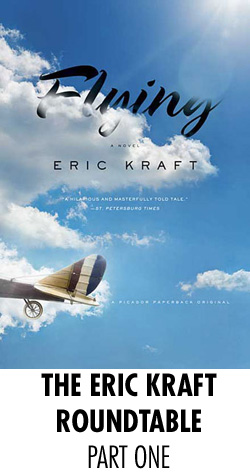 This week marks the release of Eric Kraft‘s Flying, a collection of three novels that include Taking Off, On the Wing, and the previously unreleased Flying Home. This trilogy forms the latest set of volumes in Kraft’s ongoing series of books set in the Peter Leroy universe, which Kraft has devoted more than a million words to. Peter Leroy is a dreamer who has been writing his “memoirs” about growing up in a town called Babbington, New York. But his stories tend to be wild lies. And if Peter is committed to the pursuit of a certain form of truth, why then are his “memoirs” such elaborate yarns? Why is there also so much corresponding ephemera in these books?
This week marks the release of Eric Kraft‘s Flying, a collection of three novels that include Taking Off, On the Wing, and the previously unreleased Flying Home. This trilogy forms the latest set of volumes in Kraft’s ongoing series of books set in the Peter Leroy universe, which Kraft has devoted more than a million words to. Peter Leroy is a dreamer who has been writing his “memoirs” about growing up in a town called Babbington, New York. But his stories tend to be wild lies. And if Peter is committed to the pursuit of a certain form of truth, why then are his “memoirs” such elaborate yarns? Why is there also so much corresponding ephemera in these books?
In the case of Flying, we see two differing narratives. The young Peter builds an aerocycle (that curiously does not fly) and travels cross-country in the 1950s. The older Peter, in the present day, is likewise traveling across the nation with his wife Albertine in an Electro-Flyer. Many of the stories presented in these books conflict or even revise previous incidents that have appeared in the Leroy chronicles. And in an effort to unpack Flying further, we’ve enlisted an able team of readers to offer their thoughts on Kraft’s work. There is also a three-part podcast interview with Kraft coming later in the week as well.
Sarah Weinman writes:
I wanted to open the discussion with a quote from the end of On the Wing because, to my mind, it not only sums up the book but a general state of mind:
If strangers should come into your midst, strangers passing through, visitors from afar, take them in. Try to feel their loneliness, the terrible isolation of outsiders in an alien culture, and if they seem odd to you, if the things they say and do seem disturbingly different from the things that you and your neighbors say and do, please realize that in their loneliness those strangers may be clinging for consolation to familiar customs and trying desperately, awkwardly, ineptly to ingratiate themselves with you. Don’t reject them. Welcome them. The foods they eat, the ideas they hold, the emotions they feel, and everything they hold dear may be weird and worthless to you, but they are neither weird nor worthless to them. Open your hearts. Open your homes. Let the strangers in.
It’s hard not to feel like your heart and your mind is opened while reading all of Flying. I know both of mine certainly expanded beyond their natural limits. “Buoyant” was the word I kept thinking of while reading the book, for a number of reasons – it brings to mind a sense of uplift, like the Spirit that Peter Leroy creates and concocts to get him away from Babbington and on to New Mexico; a sense of wonder at how much Kraft builds into what looks on the surface to be rather straightforward prose; the longstanding back-and-forth, years in the making, between Peter and Albertine in their older years; and the way in which Kraft forces the reader — or at least me — to accept the fullest possible spectrum.
Peter is a dreamer, a creative type, his heads in clouds like those depicted on the book’s cover. His quest to be airborne is harebrained and strange and yet it enables him a sense of heroism that persists in Babbington, perhaps longer than it ought to, as his late-in-life journey with Albertine to retrace those younger steps proves. But without Albertine as his anchor, Peter’s impossible dreams might not be able to be interpreted, or would be so extreme as to lose their context. She grounds him, but just enough so that his sense of buoyancy isn’t in danger of being stifled. And together, they encounter a whole host of strangers in their travels, like the couple named Bonnie Parker and Clyde Barrow, greeted with disbelief by the hotel clerk until the man offers a name change to Darrow (yeah, I love little jokes like that.)
But the real buoyancy comes from the way Kraft blurs the lines between what is real and what is not. Take the alternating structure of then (Peter writing his memoirs of the aeronautic trip, and later his account of attending the science institute) and now, with Albertine wryly checking in to find out what is the truth — or at least, what truth Peter is willing to admit to her (or to himself?). “I can poke and probe and bring something back, and then I can add to that whatever else comes drifting in on the wind, and out of what I actually remember and what comes drifting in I can make something that resembles a memory,” Peter says early on when Albertine implores him to describe the flight “beyond which I was going to make things up.” A simplistic view of Flying is that it explores the murky terrain between real and fake, but I think that notion takes away a lot of the beauty of the line-blurring. Even though I gobbled the book up in two sittings, I couldn’t ignore the feeling of walking on quicksand, with the threat of being swallowed up by the fuzzy lines of Peter’s heightened reality examined at close level. There are a lot of wonderful tricks to obfuscate that murkiness, especially in Flying Home when Peter is engaging in all sorts of madcap adventures with his young friends and the trick of a camera focused on a girl he has a crush on. But even there, reality is less interesting than imagination, as Peter describes in relation to another girl named Andrea, thanking her “for saving me from falling in love with an immaterial ideal rather than a real girl….the dark-haired girl I was falling in love with was not a girl at all. She was not the one in the window that I’d seen from the observatory, and she was not in any of the ones that I’d met or seen or thought I’d seen on my trip from Babbington to Corosso. She was a creature of my imagination, my dark-haired Galatea, sculpted from a memory of a dark-haired girl I’d seen sunning herself on the foredeck of a lean blue sloop when I was eight…” And who is “the dark-haired girl who had made me notice-or imagine – all the others?” Kraft, writing in Leroy’s voice, hints it will be Albertine, but that too seems to be part of the reality/fiction blurring…
One more thing, because it’s all too easy to wander down alleyway after alleyway getting lost in thought and analysis — which, I suspect, is part of Kraft’s intentions with Flying and the other Peter Leroy books (so far I’ve read two others, Inflating a Dog and Reservations Recommended, both very different but of course, forever linked up.) It’s hard not to put Flying in context with the plethora of memoirs, real or fake, on the market these days. Peter Leroy seems to tip his hat with constant references to confession and expiation, but there’s a limit to how much he’ll confess and how much he’ll make up. But Kraft also doesn’t want the reader to settle on binary conclusions: Peter Leroy is making things up therefore he is a fake, or he’s telling a good story therefore he’s a genius. No, the wonderful thing about Flying, about all the Peter Leroy books, is how they inhabit the in between spaces, looking at the margins and the scribbled notes that are both visible and invisible to the naked eye. Trusting in one truth means missing out all the others. And really, when it comes right down to it, one never knows, does one?
Edward Champion writes:
“It is a curious kind of partnership, Kraft & Leroy. The usual descriptions — author and character, ventriloquist and dummy, left brain and right brain — are inaccurate and inadequate. When we were just beginning to work together, Kraft may have thought that in me he had merely found a way to write about himself, and I may have thought that I had found a ventriloquist who was willing to play the straight man while I got the laughs, but as time has passed, each of us has found himself liberated by the other, and each of us has found that to a certain degree he has become what he is through the agency of the other. We are not the same person, though we share a mind.”
— From the introduction to Leaving Small’s Hotel
To launch off Sarah’s point about how the aperture of a reader’s heart and mind is sharply widened upon reading the Flying trilogy, I think we should likewise explore the notion of the alter ego, and how this creation of identities ties into the telling of the tale. In all of the Peter Leroy books, we are presented, on a basic level, with an author created by an author. A memoirist who is committed to a wandering organization of memories, but who requires confirmation from his trusted wife, Albertine, who may or may not be a fictional construct. Very often, this creation within creation requires alter egos within alter egos. Passionate Spectator proffers a scenario in which Kraft begets Peter Leroy, who, in turn, creates Matthew Barber, who, in turn, creates B.W. Beath. (This, in itself, recalls the comparatively simpler nesting of Barber/Beath in Reservations Recommended, which is, rather interestingly, predicated upon the form of a restaurant journey experienced by Barber and written up by Beath in his newspaper reviews.) We learn throughout the books that Peter Leroy’s childhood friend Raskol (named after Dostoevsky’s often hallucinatory prevaricator) is an invention. Matthew Barber may be real in these books, but he also serves as a stiff conformist counterpart to the “real” Leroy. (In the Flying trilogy, while Leroy journeys to New Mexico in his nonflying aerocycle, it is Barber who opts to fly by commercial airliner. Where Leroy glories in the hops, or stages, of the journey, Barber requires a flight in one go.)
In the later Leroy books, we have also seen a greater concern for a formalist structure. Whereas the earlier books feature an introductory interjection from Peter in the present, the later books present alternating chapters of Peter and Albertine in the present and Peter in the past. Leaving Small’s Hotel, which is almost a prototype for what Kraft pulls off in the Flying trilogy, sees Peter and Albertine about to sell off their hotel. In the spirit of Scheherazade, Leroy tells a new chapter every night of his life in the fifty nights leading up to his fiftieth birthday, hoping that these episodes will serve as a draw to new customers, and Kraft juxtaposes Leroy’s struggles to fix a decaying hotel in the present with a story from the past involving Leroy trying to construct a Flying Saucer Detector and communicate with the town of Babbington through an underground radio network. The destruction that lives in the present is bolstered by the construction from the past. We see this theme crop up in the Flying trilogy as well, but Peter and Albertine seem to embrace the inevitable end to their memories in the present. Instead of operating a hotel, they check into many rooms at other hotels. They are very much strangers passing through (as we see in the passage quoted by Sarah) and they attempt to convey their joy to others, such as the amusing episode with the clerk, in which Peter cadges off power to recharge the Electro-Flyer and Albertine explains the delight of receipts (“It’s a caprice of mine — saving receipts. I keep them in albums — the other people keep photographs. They are mementoes, tokens of the fleeting moments of my life.”).
I’m curious what your thoughts and feelings are on Leroy’s need to collect. Why it is so essential to Leroy’s need to tell the tale? If Leroy gets his memories wrong, he somehow manages to authenticate it with various clippings, photos, and other minutiae. But is he really authenticating it? Or is he less of an exuberant hero and more of a tragic Quixote? Why is memorializing the past so important to Leroy? Does he need the past to accept the unexpected developments of the present, such as the rather bizarre notion of dogboarding? Or is he memorializing the past because the present is too unkind to him and does not wish to regard him? And if the past is so important, why then must he avoid confronting the truth through these alter egos? The reader may very well enjoy the adventure, but if the relationship between Leroy/Kraft and his readership is predicated upon auctorial liberation, are the many minds offered here to share stories undermined by the inherently self-serving nature of the project? Or must we welcome all these characters because life is just as much about listening and welcoming odd and possibly lonely strangers who we must not reject?
There is also something quite interesting in the way Kraft’s blurring of the real and the fictive subverts odd little truths throughout his books. Leroy’s unusual paraphrasing of Lao Tzu (“A journey of a thousand li begins with a single step”) in On the Wing suggests that the little maxims we categorize under Taoism may not necessarily help us understand the true nature of the universe. Or that the true nature of the universe cannot possibly be understood through any form of philosophy. Lao Tzu certainly doesn’t get Leroy very far. But the talking Spirit of Babbington, whether hallucinatory or imaginative, helps Leroy to get his bearings. Likewise, the typo on the Kap’n Klam sign (THE HOME OF HAPPY DINNERS!), which has the stiff Matthew Barber (again, an alter ego; but perhaps one debilitating to Leroy’s ebullience) quibbling over whether dinners have feelings, suggests that the joys of imagination can sneak up on us even through a misheard literalism. Is imagination a surrogate for philosophy? Or does the only sane response to an ever-shifting America involve escaping into dreams like Peter Leroy or Walter Mitty? I’m also curious about how you folks felt when reading this book. As Sarah suggests, there is indeed a strange simultaneous feeling of joy and walking on quicksand. (Kraft’s constructs have a tendency to sneak up on you. There were times in which I had to put the book down, so that I could properly process the story beneath the story, and the alter egos behind the alter egos. And yet wandering through Leroy’s imaginative terrain proved terribly intoxicating. I felt a strange compunction to remain puzzled by the inconsistencies.) But I’d like to propose that this is because Kraft is attempting to give the reader a visceral feeling of imaginative detachment. Perhaps to some degree, this detachment makes up for the self-serving nature of the curious Kraft & Leroy partnership cited above. Or maybe he’s suggesting that we’re all pretending like Leroy in an effort to survive. We all have our roles and it’s just possible that if all of us revealed the totality of our interior hearts and minds in a book, and confessed what we wished to remember, that we might likewise accuse each other of being as egoistic as Leroy.
I’d also like to get into the notion of “swagger” as it recurs throughout the book, particularly with the MDMC and the strange count at the institute. But I think I’ll step aside for now, and let others offer their summation of the many threads within this quite intriguing volume.
Brian Francis Slattery writes:
Sarah, I was delighted that you started with the passage you quoted, because one of my favorite moments in the whole trilogy happens immediately after and because of it:
“…Open your hearts. Open your homes. Let the strangers in.” I paused. In the hush, I could hear sniffles. Then I asked, “Would anyone out there be willing to put me up for the night?”
That little passage made me laugh so loud that I woke my poor wife, who gets up much earlier than I do. In the course of reading Flying, I actually woke her many times by laughing too much and too loudly; she has grown perhaps to resent Eric Kraft for the hours of sleep she’s lost.
I realize that Sarah and Ed are zeroing in on the meat of the book, the sort of epistemological questions about truth and memory and the like. I don’t mean to derail that conversation, either. But the thing that stands out for me about Kraft — who is playing on the same playground as Proust, Nabokov, and several centuries’ worth of other fiction writers and continental philosophers — is how damn funny he is, and not in a no-really-it’s-funny way, like you have to be with some books when you want to encourage certain people to read them, but really actually funny. Kraft’s jokes would go over well in bars; they’d be funnier after three drinks than after one, and I mean that as a serious compliment. The riff about Peter’s father creating an early remote for his TV; the several scenes in various restaurants (“‘What if I’m allergic to something [in the food]?’ I asked. ‘What are you allergic to?’ ‘Penicillin.'”; “The man of the family ordered at once: ‘Corned beef hash, poached eggs, biscuits, home fries, sausage, bacon, a pork chop, extra gravy and a beer.’ He thought for a moment, then said, ‘Make that two beers.'”); the collect call to his father near the end–these and many more are out-and-out hilarious.
At first, the sort of epistemological stuff and the funny stuff struck me as not having much to do with each other, apart from making Flying both smart and super-entertaining. But as the trilogy went on, I started more and more to see the humor as a tool that Kraft uses to talk about the questions about truth and memory that he’s interested in. Take a look at that collect call, the one Peter makes to his dad near the end of Flying Home:
“Hello?” said my father.
“I have a collect call for Mr. or Mrs. Leroy from Peter,” said the operator. “Will you accept the charges?”
“Peter?” said my father, as I’d known he would.
“Hi, Dad,” I said.
“Will you accept the charges?” asked the operator.
“I’m not sure,” said my father. “How much will this cost?”
“Dad, please accept the charges. I need to talk to you.”
“Young man, stop talking,” said the operator. “I’m going to have to cut you off if the other party will not accept the charges. Are you Mr. Leroy?”
“Yes,” my father said.
“Will you accept a collect call from Peter?”
“How can I be sure that this is really my son?”
“It’s me,” I said.
“Young man,” said the operator, “if you speak again, I will cut you off.”
“Can I just say something to convince my father that I’m his son?… I just want to identify myself.”
“How do you propose to do that?”
“I’ll tell him something that only I would know.”
“All right… go ahead young man,” the operator said.
“I’ll be home on Tuesday,” I said.
“Will you accept the charges?” asked the operator.
“I’m not sure,” said my father. “He doesn’t sound like my son. Of course, it’s been so long since I heard from Peter that I can’t be sure. His voice may have changed…. Peter would be calling to ask for money. I’m sure of it.”
First off, of course, it’s funny — in fact, one of my cousins had told the same joke at a family gathering just a few weeks before I read this passage, about how in the days before cell phones they’d use the automated collect-call service to send messages to their parents from pay phones (e.g., “Will you accept the charges from I’ll Be Home at 11?”). But now look at the passage again, this time with your armchair philosopher’s cap on. This little piece of conversation drives straight at the heart of the books–“the notion of the alter ego, and how this creation of identities ties into the telling of the tale,” as Ed put it. In Flying, the tale creates the identity as it goes along, and it’s important that it’s done with such lightness. The big question of “who is this” or “who am I,” whether asked by the author (whoever that is) or one of the characters–a question that so many of Kraft’s predecessors treat with such seriousness — Kraft treats as a game, and the way Kraft plays it, at least to me, it’s a lot more like kickball than like chess. It’s wonderful and refreshing, and in the context of the many works that have preceded it, it seems to have a really nifty point to make (here’s where I really start flying by the seat of my pants). Complete objectivity is, after all, impossible. Your memory of damn near everything is almost certainly faulty in some way or another. And if you spend all your time in a cork-lined room agonizing about it (sorry, Marcel, sorry!), you’ll never take that trip, or have that beer, or let that stranger in.
But it’s not just Kraft telling his predecessors to lighten up. Frank Mankiewicz, George McGovern’s campaign manager, famously said that Hunter S. Thompson’s coverage of McGovern’s 1972 presidential campaign was “the least factual and the most accurate.” Both in the fictional world of the book and the relation between Kraft and Leroy, how much does what really happened matter? I don’t know; but it seems to me that we learn so much more about who Peter Leroy is because he lies, and lies, and lies again, than we ever would have if he stuck to telling the truth.

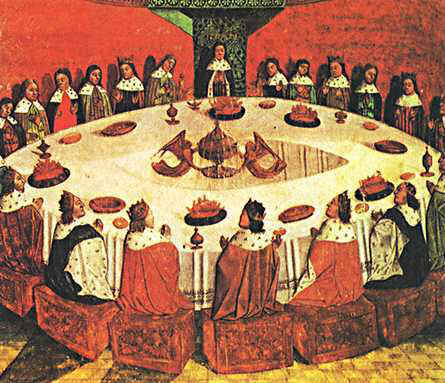
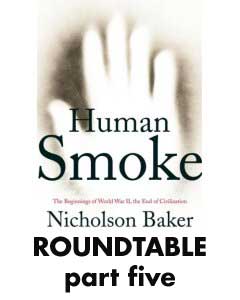 There have been so many interesting topics raised here that I feel a bit guilty for throwing a few more talking points into the mix. Nevertheless, since we’re bringing this conversation to a close, I’m curious what you folks have to say about how Baker challenges our assumptions that World War II was the “good war” and thus the “good victory.”
There have been so many interesting topics raised here that I feel a bit guilty for throwing a few more talking points into the mix. Nevertheless, since we’re bringing this conversation to a close, I’m curious what you folks have to say about how Baker challenges our assumptions that World War II was the “good war” and thus the “good victory.” 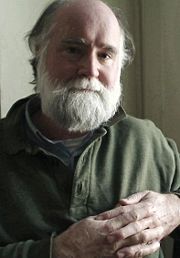 Dear Roundtablers– What’s amazing to me is that all this explicative incandescence, this un-angry criticism, this enriching supplemental observation has gone on right at the very moment Human Smoke is published. This is better than any book review, and it’s more than any writer deserves.
Dear Roundtablers– What’s amazing to me is that all this explicative incandescence, this un-angry criticism, this enriching supplemental observation has gone on right at the very moment Human Smoke is published. This is better than any book review, and it’s more than any writer deserves. 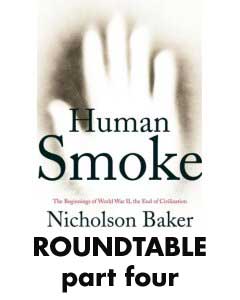 I dithered on whether to bring the book with me on my trip, and decided to leave it at home, so I don’t have the dog-eared page references handy. First with the quick thoughts, then with the rant:
I dithered on whether to bring the book with me on my trip, and decided to leave it at home, so I don’t have the dog-eared page references handy. First with the quick thoughts, then with the rant: